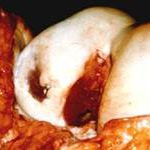Have you got articular cartilage injury of your knee? Cartilage repair can cure knee pain in India. Otherwise it can lead to arthritis. Prompt treatment can prevent this. Learn more about this here.

![]() Articular cartilage is the lining cartilage at the end of bones of all synovial or bag like joints. It has the properties of stress dissipation and lowering the friction within joints. It is responsible for preserving the effortless mobility of all joints. Complete loss of articular cartilage results in osteoarthritis. Osteoarthritis is a form of joint failure like heart failure or kidney failure. In pre-arthritic forms cartilage loss is localised. It is seen in the following conditions.
Articular cartilage is the lining cartilage at the end of bones of all synovial or bag like joints. It has the properties of stress dissipation and lowering the friction within joints. It is responsible for preserving the effortless mobility of all joints. Complete loss of articular cartilage results in osteoarthritis. Osteoarthritis is a form of joint failure like heart failure or kidney failure. In pre-arthritic forms cartilage loss is localised. It is seen in the following conditions.
1) Chondral fracture-this means a fracture of the cartilage. It results when the cartilaginous surfaces at the ends of the femur, patella and the tibia grate against each other in a single twisting injury. It can be associated with a ligamentous injury like an anterior cruciate injury. If seen within two weeks it may be possible to re attach the piece to its bed but later when healing has taken place, this may not be possible.
2) Chondromalcia- Here the cartilage softens and later gets eroded to the underlying bone. This usually affects the under surface of the knee-cap. Similarly, the femoral cartilage may be involved. The causes may be chemical, mechanical or unknown. There are four grades of severity. Chondromalacia becomes osteoarthritis when there are kissing lesions affecting both contacting bones.
3) Osteochondritis Dissecans- This is a chronic condition affecting young children in the age group 10-13 years. It results in the flaking off a small area of the weight-bearing surface of the femur. Here the cartilage with underlying bone chips off. The fragment, which is identified at first by swelling, separates from its bed later and may become a loose body. The bed heals over.
4) Osteoarthritis- In this disease there is complete erosion of the cartilage to the underlying bone involving both the contacting surfaces. It was thought earlier that osteoarthritis is a degenerative disease affecting elderly people. However it is now clear that the articular cartilage damage is multifactorial resulting from genetic causes, repeated micro trauma in obese people, knee mal alignment as in bowlegged and knock-kneed individuals and secondarily from a long list of causes which includes instability, meniscal tears, infection etc.
Symptoms
Articular cartilage by itself has no pain fibres. Therefore, there may be no pain at all in early stages of cartilage damage. Pain signals emanate from other tissues surrounding the joint like the capsule, irritated by the products of cartilage damage. There may be a crunching or grating sensation within the joint. There may be minor aches and pains and some swelling. Sometimes if there is a loose body then the patient may fall unexpectedly. There may be a locking feeling due to pain or a loose body. Swelling.
Risk factors
- Sports injuries
- Obesity
- Knee deformities
Treatment
Arthroscopy- an Arthroscopic evaluation is the most reliable way to identify early chondral separations, osteochondritis- dissecans. It may be possible to get a separating fragment to reattach by drilling through it into the bone. If the separation is full and recent, then it may be possible to reattach it by pins or screws. Loose fragments, in which the bed and the fragment have healed and it is impossible to restore the normal anatomy, can be excised. I perform the following procedures in India.
Autologous cartilage cell transplant-In this procedure cartilage cells are harvested from the patient’s knee, cultured in a medium and re-implanted into the defect. This procedure is very useful for young patients with localised articular cartilage defects. These defects do not have the potential to heal and if left untreated progress to osteoarthritis. anterior cruciate ligament reconstruction may have to precede this procedure.
See how a patient benefited from Micro fracture in India.
To get a cartilage procedure done for yourself, e mail drvenkat@kneeindia.com.

1 Comment